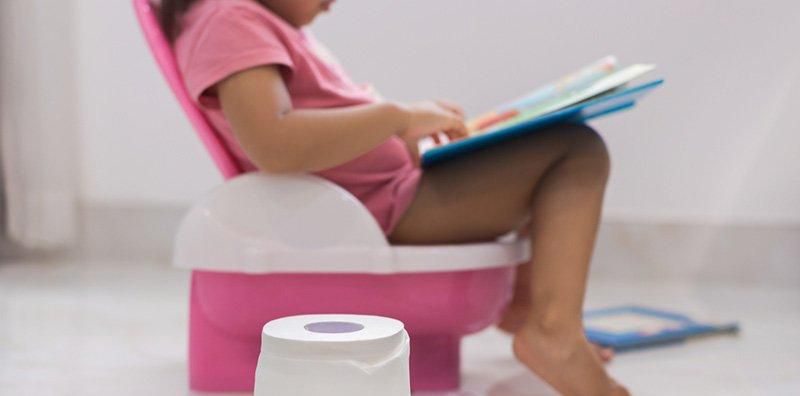Five-year-old Simi had been asleep just 10 minutes when she awoke in a panic. “She was very uncomfortable,” says her mom, Tokunbo Olatunji, who soothed her daughter back to sleep.
When Simi awoke a second time complaining that “her whole private area was itchy and uncomfortable,” Tokunbo took her to the emergency room. After an examination, she was told to follow up with their family doctor about pinworms. Sure enough, the test results came back positive for the parasite. “I felt irritated and wondered how this could have happened,” Tokunbo says. Let's talk about pinworms.
About Pinworms

Pinworms are tiny white roundworms that enter the body when people ingest or breathe in their microscopic eggs. The worms make their way through the digestive system and lay their eggs in the rectum. This may seem like a horrifying scenario from a yucky sci-fi movie. But actually, pinworm infections are common, particularly among school-aged children. According to experts, around 50 percent of kids under 18 get them at some point. It’s so easy to spread their eggs. They’re in the sand, in your houses, and on your children.
The thought of this is gross for sure, but it’s par for the course when you’ve got kids. Schools are hotbeds for transmission of all sorts. If you’re squeamish, steel yourself: Here’s all you need to know about pinworms and how to treat them.
The Symptoms of Pinworms

The most common symptoms are itching and discomfort around the rectum. Girls can experience vaginal discomfort and discharge too, as worms can get into the vagina as well. Disturbed sleep is also common because pinworms tend to emerge in the dark. However: kids can be carrying them for a long time and not know. Sometimes it’s seeing a worm after a bowel movement in a diapered child that alerts parents. You may also spot worms crawling out of your kid’s bottom.
This may be startling to see, but the worms only bring on minor skin irritation. Pinworms don’t cause harm to the body. They don’t go into the liver or brain; they don’t cause disease. And while some parents may worry that infection reflects poorly on their family, the transmission has nothing to do with where you live or how clean you are—pinworms do not discriminate.
Test For Pinworms

If you suspect your kid has pinworms, your doctor may ask you to test for them yourself by putting a piece of cellophane tape over your child’s rectum. If eggs are present, they’ll stick to the tape. Take the tape in a sealed plastic bag to your paediatrician’s office. From there it will be sent off for a lab test to confirm the diagnosis. It’s a painless procedure, but don’t be surprised if your kid freaks out a bit. “It’s really fun to try to get your child to co-operate because it’s uncomfortable and it’s weird to cover their anus with tape.
The Treatment For Pinworms

If the diagnosis is confirmed, it’s recommended that all family members who have symptoms be treated. Your doc will either suggest an over-the-counter antiparasitic medication or give you a prescription for one. The first dose is taken immediately and the second two weeks later. Kids can still go to school while they’re being treated. Common side effects include nausea, vomiting, dizziness, loss of appetite, diarrhea, cramps and drowsiness (heads-up if you’re driving).
In the two weeks between treatments, you’ll have to be diligent about hygiene. Each family member should bathe separately every morning. Wash bedding in hot water and detergent every three to seven days, and launder pyjamas and hand towels every day. You’ll also want to clean toilet seats frequently, wash toys, wipe off surfaces in bedrooms and avoid shaking out linens and bedclothes so you can keep the worms and eggs contained. Another hot tip: Flood your bedrooms with daylight. Pinworms hate the sun.
There should be an improvement in symptoms after the first dose and a marked decrease in itching seven days after the second dose. If symptoms persist or if your child has any abdominal pain that doesn’t go away, it’s best to report back to your doctor.
Prevention
It’s tough to avoid pinworms because they are so contagious, but fastidious handwashing can help keep them at bay. Cut kids’ nails short, especially in the camp and back-to-school seasons, when infections are apt to ramp up. Try to discourage thumb sucking and nail-biting, as eggs tend to hide out under fingernails. But overall, don’t worry too much about pinworm infection. It’s likely most people have had them in their lives at some point, and this, too, shall pass.
This article was first published on AfricaParent.com

)
![The truth about waist traners revealed [Credit: The Corset Center]](https://image.api.sportal365.com/process/smp-images-production/pulse.ng/13082024/663460ae-e4e0-4e3d-bfb5-364a61ff8afe?operations=autocrop(640:427))
![Here are 7 effective ways to control premature ejaculation [Credit: NetDoctor]](https://image.api.sportal365.com/process/smp-images-production/pulse.ng/13082024/f6fed057-1754-4a88-9ca5-6c13b67c0cfc?operations=autocrop(236:157))
![Here are 7 foods you need to eat for increased sexual stamina [Credit: Improving Men's Libido]](https://image.api.sportal365.com/process/smp-images-production/pulse.ng/13082024/4914d2bb-8cb1-4618-bf94-0b4b7731a10f?operations=autocrop(236:157))
![What are the causes of low sex drive in women and here’s how to increase it [Credit: Verywell Family]](https://image.api.sportal365.com/process/smp-images-production/pulse.ng/13082024/eb9deac7-dc68-4a01-8885-7317d43af034?operations=autocrop(236:157))
![Sperm- killers, here are 7 things that men need to watch out for [Credit: The Mary Sue]](https://image.api.sportal365.com/process/smp-images-production/pulse.ng/13082024/6b5ddea4-6aca-4b19-9cfd-730f94b6e876?operations=autocrop(236:157))
![7 common things that shouldn't be found in your bedroom. [bustle]](https://image.api.sportal365.com/process/smp-images-production/pulse.ng/31072024/f82f0b15-a166-4c63-bf98-c16ae77114f1?operations=autocrop(236:157))
)
)
![Here are 5 natural ways to combat erectile dysfunction [Credit: Video Blocks]](https://image.api.sportal365.com/process/smp-images-production/pulse.ng/13082024/5e3dc364-7318-40cb-a720-4ad5986ea32b?operations=autocrop(236:157))
)
)
)
)
)
)
)